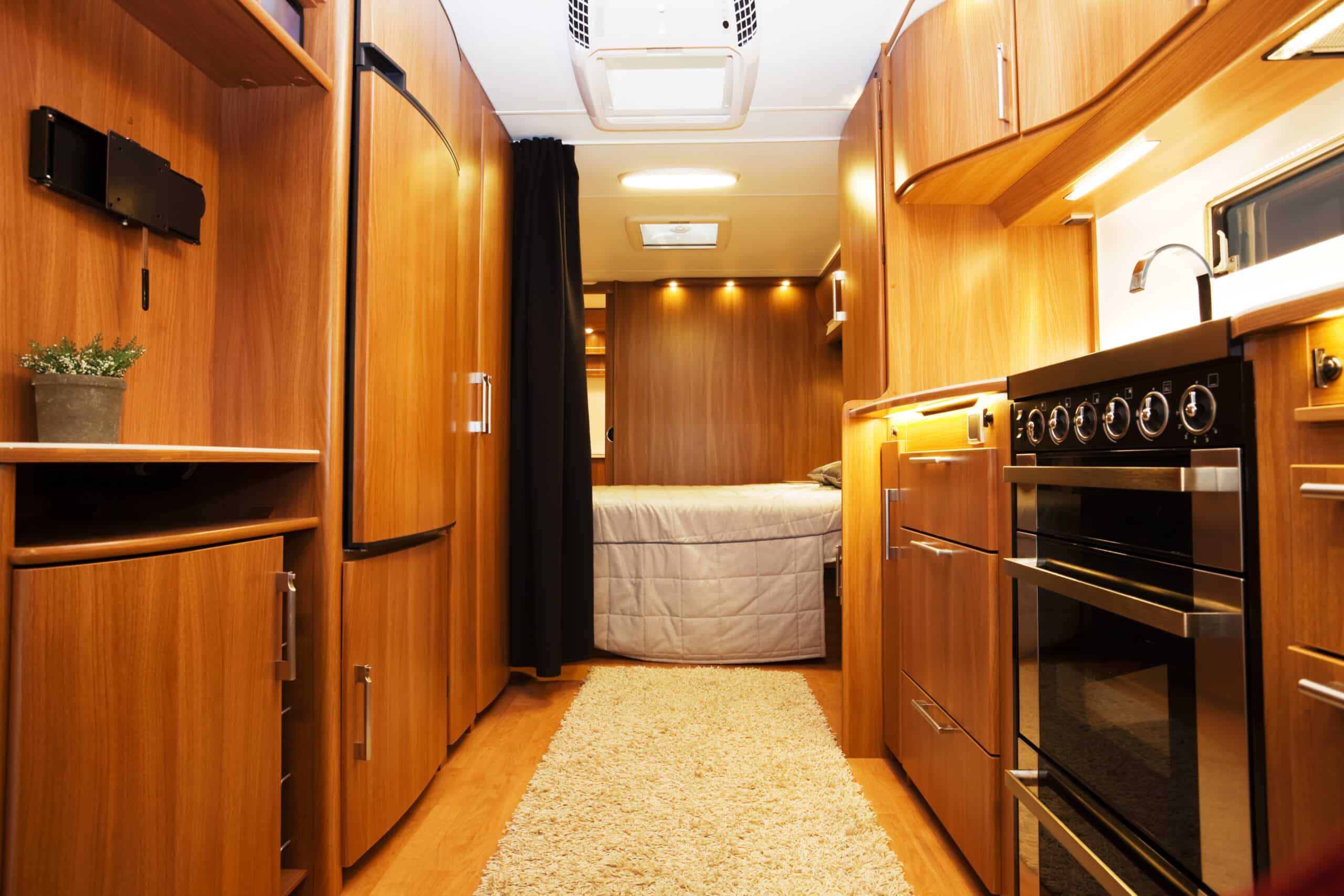5 Reasons Your Caravan Floor Creaks
Some of the links below are affiliate links. As an Amazon Associate, I earn from qualifying purchases. This means that, at zero cost to you, I will earn an affiliate commission if you click through the link and finalize a purchase.
Few things can ruin a trip faster than a non-stop annoying creak. Whether you like the convenience of a caravan’s abundant storage when traveling or participate in the new “van-lifer” trend, a creaky caravan floor can be the Achilles heel of an enjoyable experience. Luckily, you can easily fix the issue without involving a mechanic if you know what’s causing it.
Your caravan floor creaks due to an extreme weather change, a damp or poorly-secured sub-floor, wear and tear, or delamination. Depending on what’s causing the creaking, you can fix it with epoxy, shims, insulation, a drill, or oil/baby power. Tightening loose floor fasteners can also be a fix.
Read on for insightful coverage of the most common reasons caravan floor creak, what you can do to fix the problem, and how to avoid it in the future. Let’s dive right in.
Why Does My Caravan Floor Creak?
Your caravan floor may creak for several reasons, including loading on the miles on your caravan, weather changes, and water finding its way into your subfloor. How your caravan’s subfloor was installed may also contribute to creaking, and so can moisture damage.
Learning how these factors contribute to creaking is the first step in dealing with the problem, so let’s get into the details of that in the next section.
5 Reasons Your Caravan Floor Creaks
Squeaks and creaks can be a huge source of annoyance for van owners. Unfortunately, there could be many reasons your caravan emits these incessant noises.
Check out this list for the top five sources of creaks:
- Change in Weather
Any significant change in weather could affect the sturdiness of your flooring and lead to creaking. The main problem is a significant temperature change, but moisture can be an issue too.
Van flooring materials can be affected by temperature changes and moisture in different ways:
- Heat: Any metal components in your caravan floor will expand in hot temperatures. This expansion can lead to noise (such as creaking and bowing in the flooring) due to changes in the metal.
- Cold: Cold temperatures, on the other hand, can make the metal components on your caravan brittle. Over time, the cold and wear and tear on your vehicle can lead to noise and damage.
- Moisture: Water can make its way into the flooring of your caravan. If this occurs, it can lead to many issues with your sub-flooring. Materials can become brittle once the water dries. Moisture can make its way through cracks and gaps or after a particularly bad rain storm.
- The Sub-Floor Isn’t Secure
Another explanation is the security of the padding of your flooring. Sometimes this initial layer breaks loose in places or isn’t installed correctly.
If your van is older or well-traveled, chances are bad installation or looseness in the sub-floor is the cause of the squeaking. These issues can be fixed in the same way the primary layer of flooring can be fixed, but you might have to remove that top layer to get to the floor’s foundation.
The key is to avoid waiting until your base flooring breaks loose. Check the squeaky areas of your van to see if any of the board or vinyl planks have broken away from their fasteners.
- The Sub-Floor Is Damp
One issue that might not come to mind is damp flooring. Heavy rain or driving through flooded areas can result in water finding its way into your flooring.
Additionally, gaps or cracks may have formed in your caravan chassis, allowing water to seep in. If you keep water stored in your caravan, check that it’s not leaking and seeping into your floors. A damp sub-floor can lead to an unpleasant squishing sound followed by creaking due to materials cracking or rusting.
- Delamination
Delamination is a phenomenon that occurs in composite materials. Most sub-flooring material is a composite fiber or wood that can succumb to delamination. This phenomenon occurs due to a combination of stress from the pressure applied to the floor and the typical weakness of the sub-floor material.
Essentially, the force applied to your caravan over time floor breaks up the material making up the sub-floor, leading to creaking and soft spots. Instead of breaking horizontally, delamination breaks a material on the vertical plane. This type of break may lead to noise when pressure is applied.
- Damage Sustained From Use
Jumping curbs, hitting potholes, and adding miles contribute to the mystery squeak and creaks your caravan emits. Every van owner should consider how daily wear and tear can affect their vehicle. Miles adding up over time can translate to missing parts, scuffs, and even creaking.
Moreover, excessive weight can lead to bowing or warping, which can cause squeaking in your caravan. An excellent way to prevent this is to ensure your cargo is spread throughout your caravan and not piled onto one spot. You could add shelving units on the walls or install storage on the roof to take some weight off the floor. Alternatively, you could shift where you place goods every time you take a trip.
6 Ways To Fix a Creaky Caravan Floor
Here are some of the easiest and most effective ways to fix a creaky caravan floor.
- Tighten Loose Floor Fasteners
Check any screws or fasteners attached to your floorboards to the chassis of your caravan. If you’ve put a lot of miles on your vehicle, these might have come loose and started squeaking or compromising the security of your caravan floor.
Luckily, this issue can be solved easily with a general wrench set such as the Makita General Maintenance Tool Set. Available on Amazon UK, this kit includes 227 wrenches and sockets for any size of fastener on your van.
All you need to do is locate the squeaky fastener and select the appropriate wrench to tighten it. With over 200 pieces to choose from, you’ll certainly have the proper size tool to tighten down your flooring.
- Find the Source of the Creak and Apply Oil or Powder
If you cannot access a tool kit, you can temporarily fix the creak with talcum powder or oil. Powder or oil dampens squeaks by lessening the friction between the flooring pieces that are rubbing and causing the noise. Any type of baby powder will work.
If you want to use oil instead, WD-40 (available on Amazon UK) is a great product to prevent creaks. It has a built-in spray mechanism that makes wide area coverage and precision spraying a breeze. It’s also specially formulated to protect metal surfaces from corrosion and moisture damage.
- Fix the Squeaky Gap With a Drill
If you have found that the floor of your caravan is squeaking due to warping or bowing, securing it with a drill can help to stop loose pieces from rubbing against and squeaking.
The Terratek Drill Driver (available on Amazon UK) is a portable and rechargeable drill that will fix your flooring in a snap. Simply find the floor area separating from your caravan and use the Terratek drill to secure it back into place.
- Patch the Separation With Epoxy Glue
If you don’t want unsightly screw heads on your flooring, you might want to look into patching up the squeaky spots with epoxy to fill in the gaps forming underneath. Super Glue Epoxy (available on Amazon UK) is a quick-drying epoxy glue that can battle any warping in your caravans flooring.
Epoxy might not be strong enough if there is a large separation between your sub-floor and finished flooring. In such cases, you need waterproof cement.
Bostik Cementone (available on Amazon UK) is a quick-drying, waterproof cement that can be used for heavy repairs. This product sets in 20 minutes, so you’ll be sure to be rid of any bothersome creaks in a short period.
- Install Shims To Stop the Creaking
Shims are a great way to level the flooring in your caravan and prevent creaking. Shims are essentially thin pieces of material designed to fill gaps to level things in various construction projects. These simple construction tools can be an easy fix if the creaking in your caravan floor is due to spaces in its construction.
Amazon offers a 36-piece package of shims by Jetec Furniture Plastic Wedges Shims that will be sure to take care of any creaks in your van. They come in various sizes and colors to match your flooring and fill gaps, but the best feature is the adjustable size. Simply measure how much material you need, and snap the shim to the desired size.
- Install the Proper Insulation for Your Floor
If you installed your caravan flooring without the proper subfloor and insulation, you might have unintentionally set yourself up for a noisy van trip. Not only can this lead to noise due to materials rubbing together, but you can also lose a lot of heat through your caravan floor without the proper insulation.
I recommend installing the Owens Corning Pink Insulation Foam (available on Amazon UK). This product is easy to cut into shape with simple tools such as a razor blade, meaning you can repurpose any leftovers for other projects. It’s also moisture resistant, which is particularly great because caravan floors are likely to come into contact with water.
How Do I Prevent a Creaky Caravan Floor?
You can prevent a creaking caravan floor by avoiding placing significant weight on the flooring, installing proper floor insulation, and keeping moisture out of the subflooring. It might also help to regularly tighten up things in your subfloor and ensure it’s properly installed.
Put otherwise, all you need to do to prevent creaking in your caravan floor is to address the causes we covered earlier. The one cause you might not be able to address is weather changes, but its impact can be negated by taking care of the other causes of creaking.

